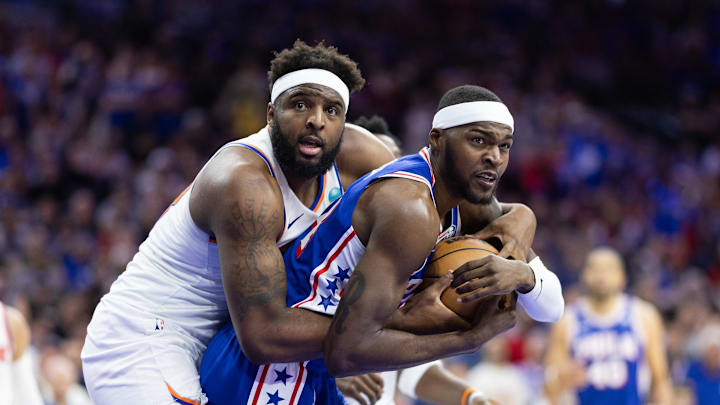The New York Knicks find themselves in an enviable yet challenging position: their early-season success without Mitchell Robinson has created a debate about whether to reintegrate the veteran center into the rotation or explore trading him to bolster the roster further.
The Knicks are currently 14-8 and hold the No. 4 seed in the Eastern Conference. Robinson is recovering from offseason ankle surgery and has returned to some basketball activities but is likely weeks from returning. Potential trade partners may want to see Robinson healthy and on the court before they're willing to swing a deal, so the Knicks have some time to work out what they want to do. But this is a decision that could make or break their championship aspirations.
Here’s a breakdown of both sides of the argument.
Trading Mitchell Robinson can help the Knicks enhance their bench depth
Trading Robinson could allow the Knicks to diversify their roster by acquiring an offensive-minded forward or wing player. This flexibility would help alleviate concerns about the team’s offensive consistency and spacing, particularly when two traditional big men are on the floor.
Currently, the Knicks’ bench rotation consists primarily of Deuce McBride, Cameron Payne, and a recovering Precious Achiuwa. While serviceable, this limited rotation lacks offensive punch, especially when paired with the starting unit. Trading Robinson to a team like the Washington Wizards (struggling to integrate young talent) or the New Orleans Pelicans (navigating injury woes) could bring in a forward who can score and create for others. Such a move might unlock high-leverage opportunities in close games and give stars like Mikal Bridges and OG Anunoby more rest.
Additionally, Robinson’s history of injury issues remains a concern. Swapping him for a durable offensive contributor could lower the team’s risk of mid-season setbacks and build a more well-rounded playoff roster.
Jericho Sims’ breakout give the Knicks insurance if they trade Robinson
Jericho Sims’ emergence as a defensive force has been one of the most pleasant surprises for the Knicks this season. Trusted with backup duties while Precious Achiuwa was out, Sims has thrived, showcasing elite rim protection and strong interior defense.
Opponents are shooting just 38.9 percent in the paint (non-restricted area) against Sims, highlighting his ability to anchor the defense. Furthermore, his athleticism and durability make him a consistent option to spell Karl-Anthony Towns. While Robinson has a similar defensive style, Sims has proven himself more dependable and cost-effective. If Robinson were moved, Sims’ minutes could increase without much drop-off, freeing up cap space and roster spots to address other needs.
Keeping Robinson gives the Knicks an elite backup center
Despite Sims’ growth, Robinson’s skill set as a defensive anchor and lob threat remains unparalleled. As one of the league’s top shot blockers, Robinson’s impact on both ends of the court is critical for the Knicks’ interior game. His chemistry in pick-and-roll situations makes him a valuable offensive contributor without needing high usage, helping stars like Towns, Bridges, and Anunoby thrive.
Robinson also offers unique physical advantages, with a 7-foot-4 wingspan and elite mobility for a center. His ability to finish above the rim and defend taller opponents adds an extra dimension to the Knicks’ rotation that neither Sims nor Achiuwa fully replicates.
Moreover, Robinson is signed to a team-friendly contract, making $12.9 million in 2024-25 and $12.0 million in 2025-26. Given his production and upside, this deal offers excellent value, whether the Knicks decide to keep him long-term or trade him down the line.
The decision to trade Mitchell Robinson hinges on the Knicks' assessment of their championship window. If they believe their current roster is a legitimate contender, keeping Robinson provides invaluable depth and defensive reliability for a deep playoff run. However, if the team views Robinson as expendable due to Sims’ rise and the need for improved offensive versatility, moving him before the trade deadline could unlock a higher ceiling.
Either way, the Knicks are in a strong position, boasting a top-four record in the East and multiple paths to improve further. With Robinson expected to return in January, the coming weeks will reveal whether he fits into the Knicks' long-term plans or becomes the centerpiece of their next big move.
